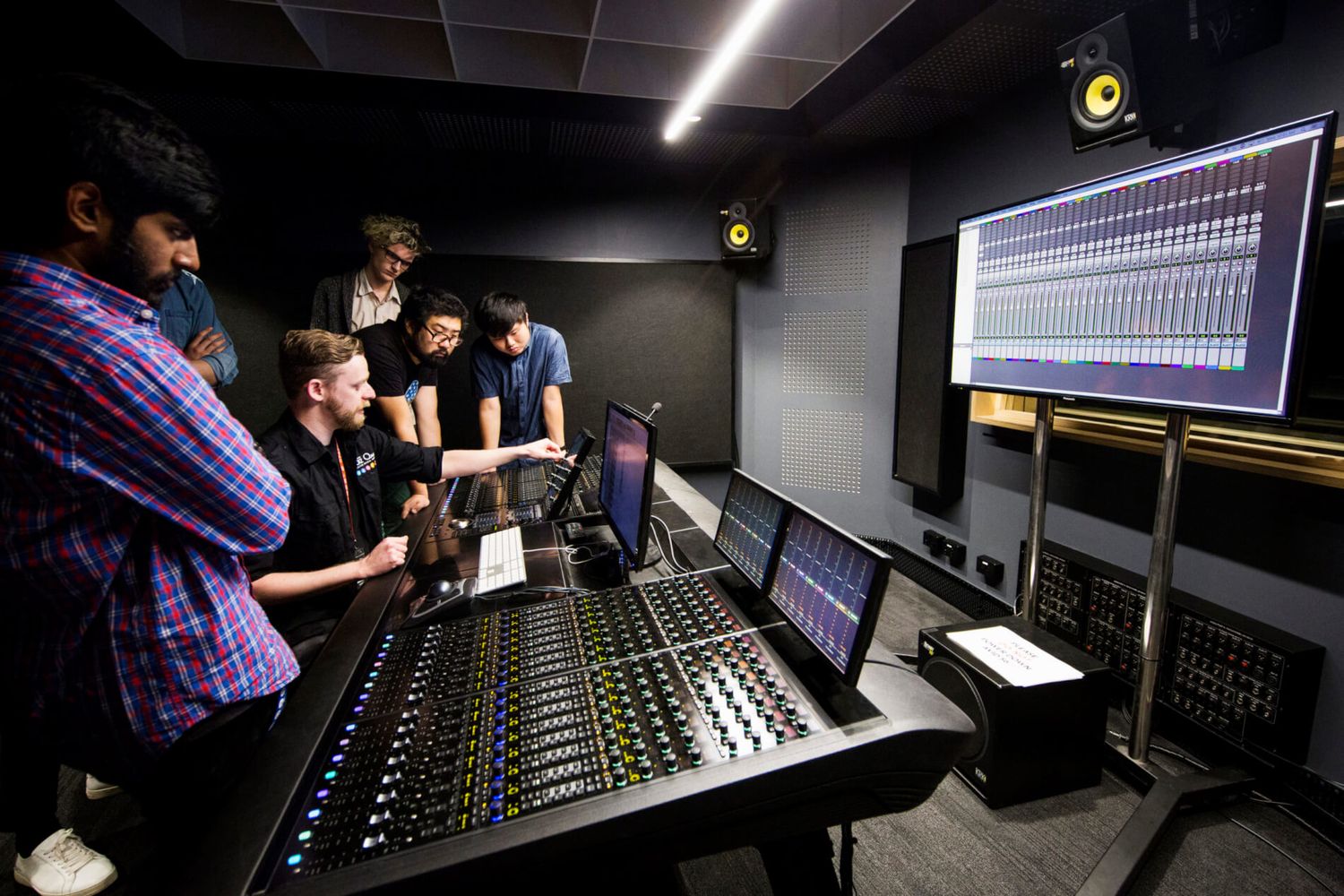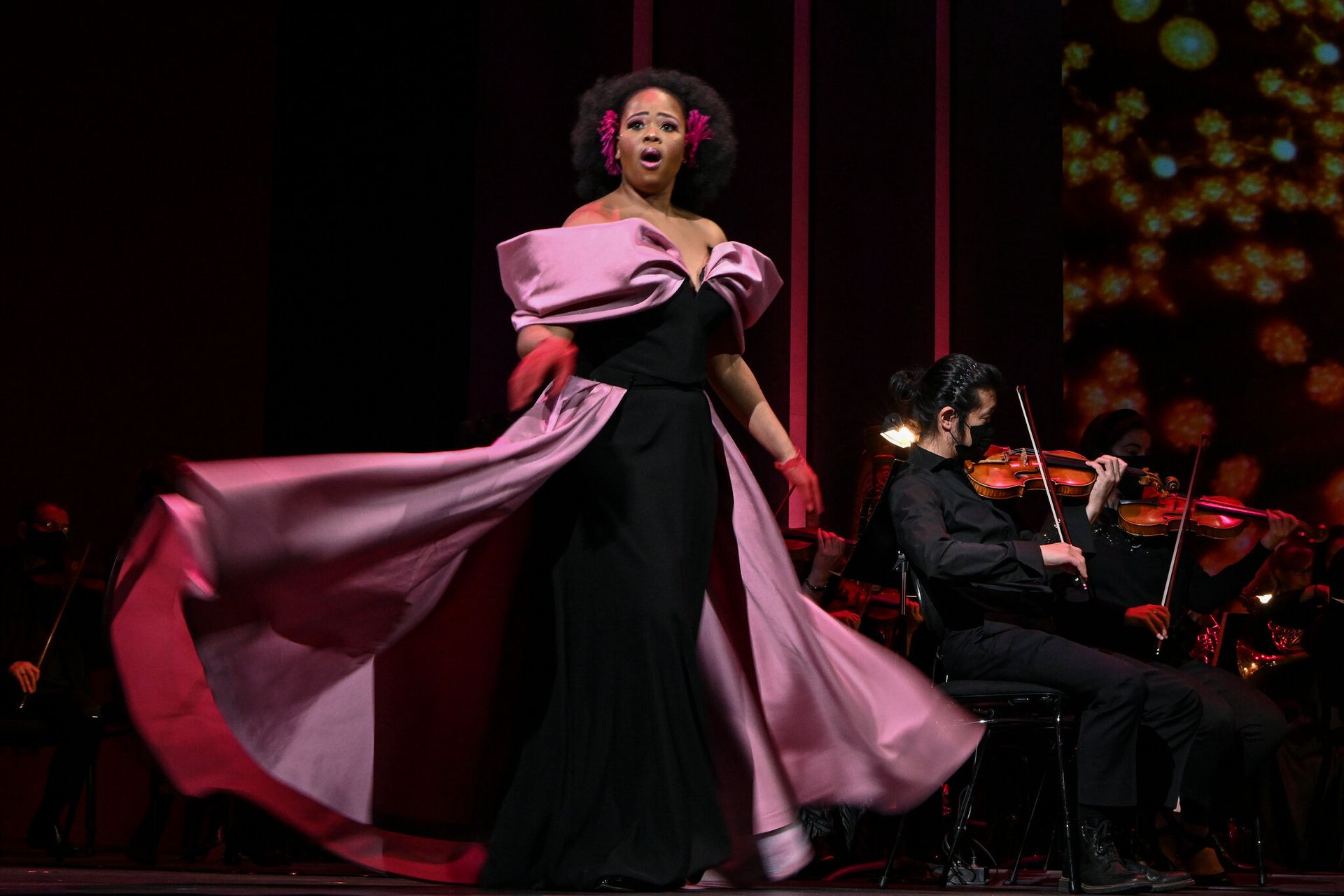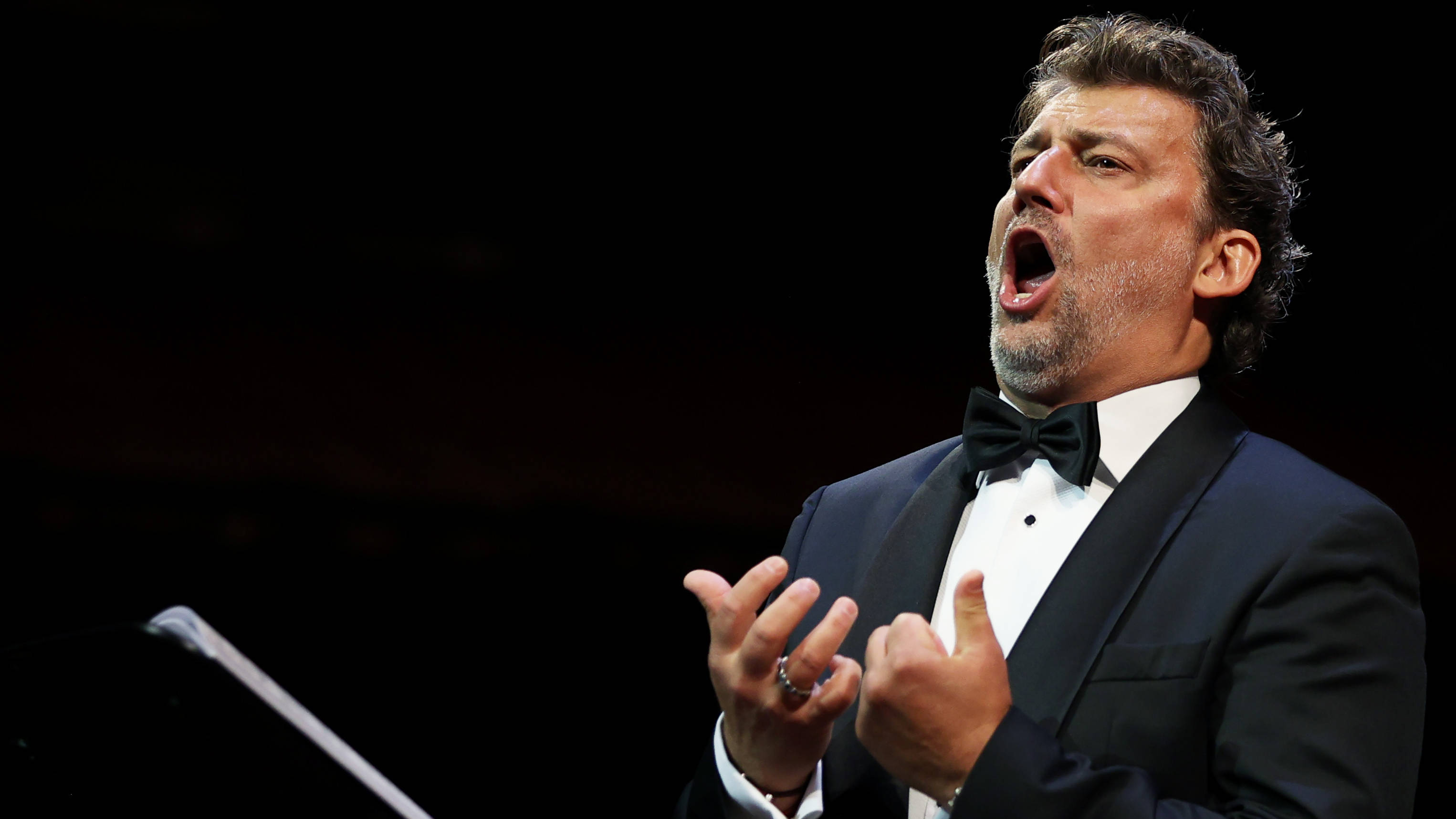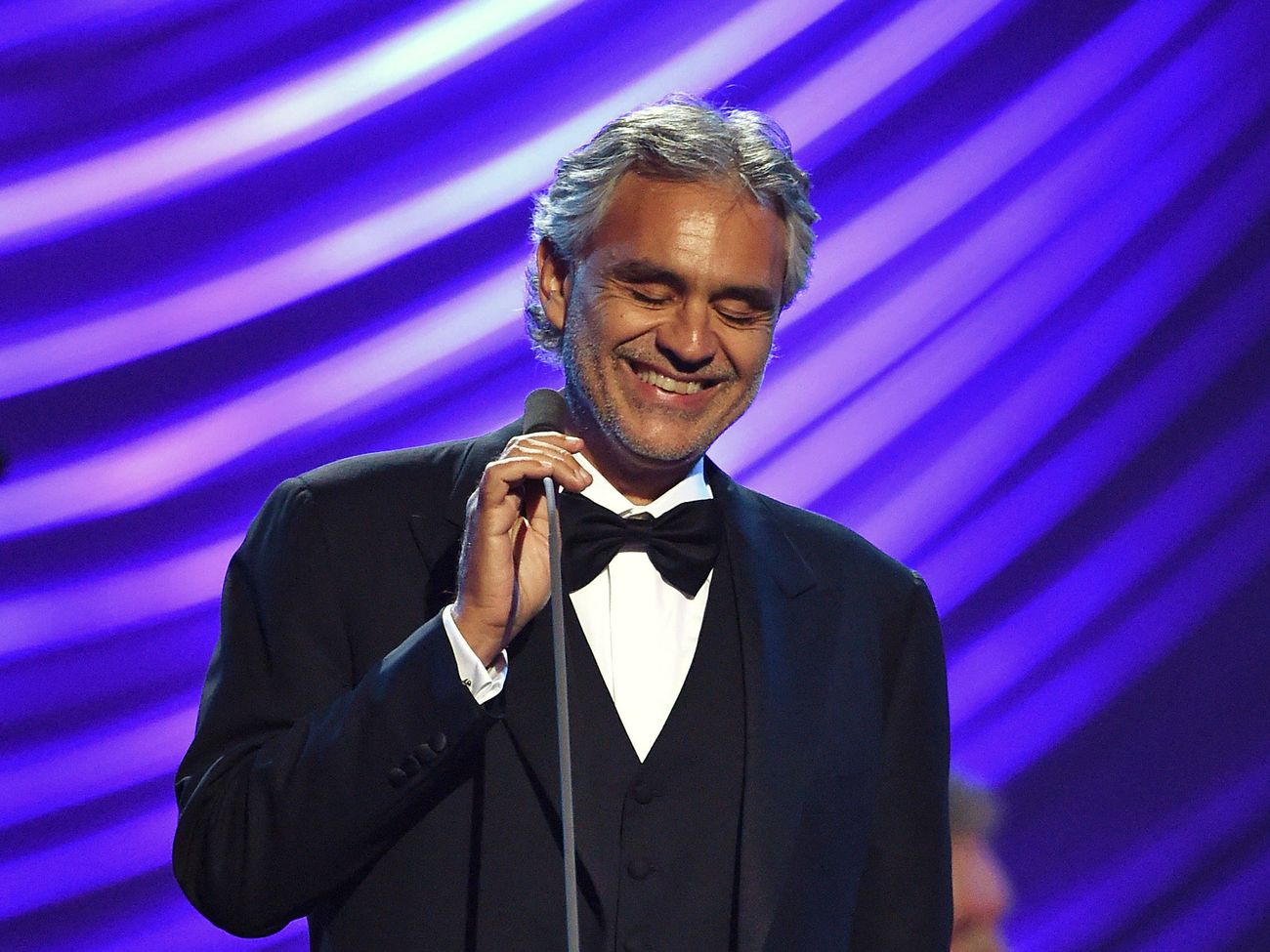Home>Events & Info>Opera>How Do You Become An Opera Singer
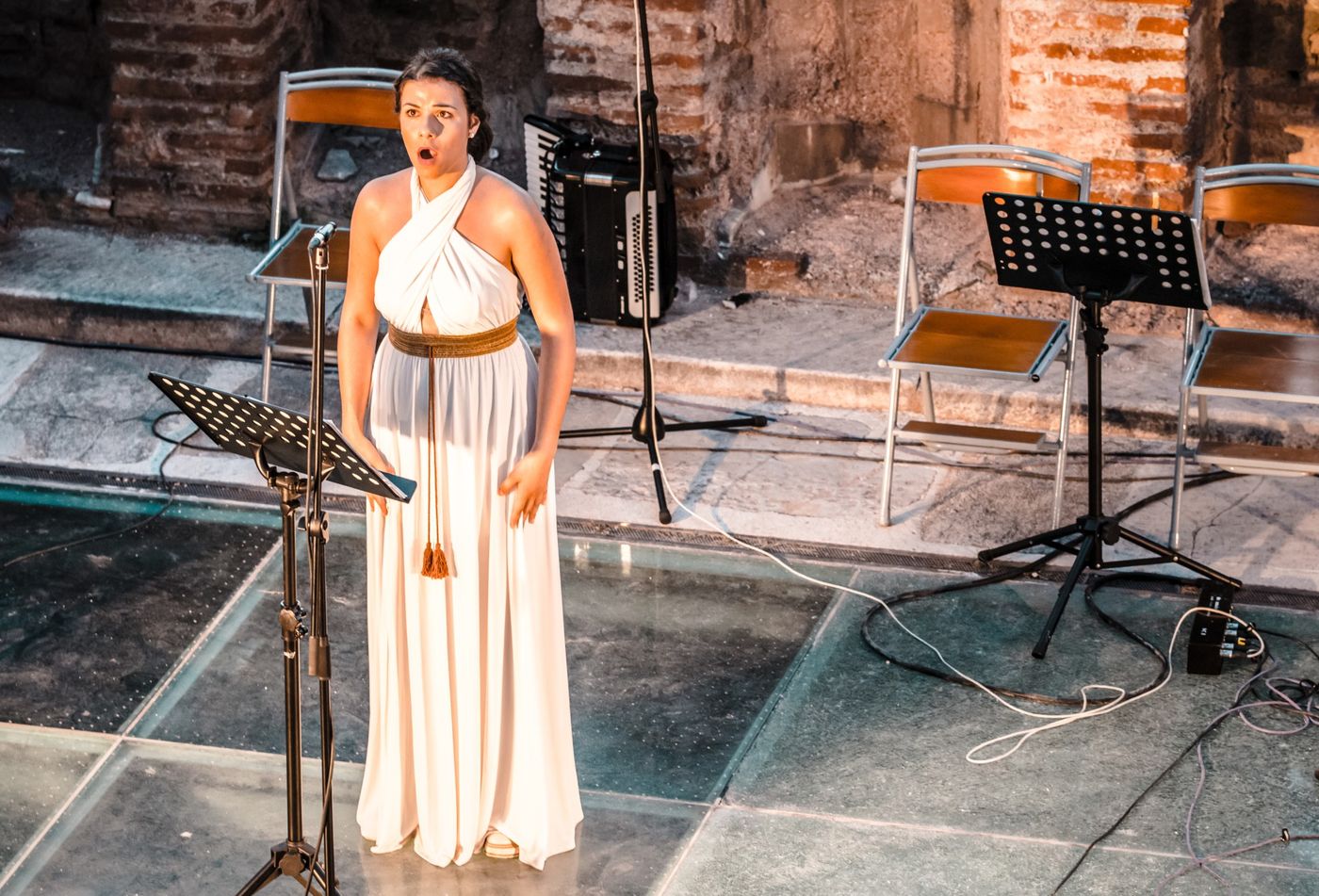

Opera
How Do You Become An Opera Singer
Modified: January 22, 2024
Learn how to become an opera singer and fulfill your dreams of performing on stage. Discover the steps, training, and opportunities in the world of opera.
(Many of the links in this article redirect to a specific reviewed product. Your purchase of these products through affiliate links helps to generate commission for AudioLover.com, at no extra cost. Learn more)
Table of Contents
Introduction
Opera, often regarded as the pinnacle of vocal performance, is a captivating art form that combines singing, acting, and storytelling in a grand and theatrical way. The world of opera has a rich and storied history, with legendary composers like Mozart, Verdi, and Puccini creating timeless masterpieces that continue to be performed on stages around the world. Being an opera singer is a dream for many, but it takes a combination of talent, training, dedication, and a deep understanding of the art form to succeed in this challenging yet rewarding field.
In this article, we will delve into the process of becoming an opera singer and explore the training, skills, and experiences that are essential for a successful career in opera. From voice lessons and technique to language and diction, acting and stage presence to auditions and competitions, we will cover the key aspects that aspiring opera singers need to focus on. We will also discuss the importance of networking, gaining experience, and building a repertoire, as well as the challenges that opera singers may encounter along the way.
Whether you are a young artist embarking on your operatic journey or a music enthusiast curious about the world of opera, this article will provide valuable insights into the path of becoming an opera singer. So, let’s dive in and explore the fascinating world of opera, where passion, talent, and dedication combine to create extraordinary performances that touch the hearts and souls of audiences.
Training and Education
To become an opera singer, a strong foundation in both music and vocal training is essential. Many aspiring opera singers begin their journey at a young age, receiving formal training in music and participating in school and community choirs. However, it is never too late to start cultivating your singing skills and pursuing a career in opera.
One of the first steps in training as an opera singer is to seek formal education in music. Many universities and conservatories offer undergraduate and graduate degree programs in vocal performance or opera studies. These programs provide comprehensive training in music theory, ear training, vocal technique, repertoire, and stagecraft. They also offer opportunities to perform in student opera productions, which are valuable experiences for honing performance skills and gaining practical knowledge of the opera world.
In addition to formal education, private voice lessons play a crucial role in an opera singer’s training. Working with a skilled voice teacher can help develop proper vocal technique, expand range and flexibility, improve breath control, and enhance overall vocal performance. Voice lessons also help in discovering and nurturing the unique qualities of an individual’s voice, allowing them to develop their own distinct style and sound.
Language and diction are also vital aspects of training for opera singers. Since operas are performed in various languages, including Italian, French, German, and English, singers must have a good command of diction and pronunciation in each language. This requires studying the rules and nuances of each language, as well as working with language coaches to fine-tune pronunciation and understand the meaning and emotions behind the lyrics.
In addition to the music and vocal training, acting classes are essential for opera singers. Opera is not just about beautiful singing; it is also about captivating storytelling through music and stage presence. Acting classes help opera singers develop their stagecraft skills, allowing them to embody their characters and convey emotions effectively on stage. Learning how to use body language, facial expressions, and movement to enhance the performance can bring depth and authenticity to the operatic experience.
Overall, a well-rounded education and training in music, vocal technique, language, and acting are the building blocks for becoming a successful opera singer. These foundations, combined with hard work, dedication, and a passion for the art form, provide a solid preparation for the journey ahead.
Voice Lessons and Technique
Voice lessons and technique are fundamental aspects of an opera singer’s training. Developing a strong and healthy vocal technique is essential for achieving vocal longevity, flexibility, and expressiveness.
One of the primary focuses of voice lessons is developing proper breath control and support. Opera requires singers to have excellent breath control to sustain long phrases and project their voices in large opera houses. Voice teachers work with singers to improve diaphragmatic breathing, ensuring the breath is efficiently utilized to support the voice and create a rich, resonant sound.
In addition to breath control, vocal technique encompasses various aspects such as vocal warm-ups, vocal exercises, and vocal health. Warm-ups and exercises help singers warm up their vocal cords, expand their range, and build strength and agility. These exercises include scales, arpeggios, and vocalises that target specific vocal skills and areas of improvement.
Vocal health is integral to an opera singer’s career. Singers must take care of their vocal instrument by practicing proper vocal hygiene and adopting healthy lifestyle habits. This includes staying hydrated, avoiding excessive throat clearing, and avoiding vocal strain or overuse. Working with a vocal coach or speech-language pathologist can help identify and address any vocal issues or habits that may be hindering vocal performance.
Another important aspect of vocal technique for opera singers is vowel placement and resonance. Singers work with their voice teachers to identify the optimal placement of vowels in their vocal tract to achieve maximum resonance and clarity of sound. This helps in producing a beautiful, focused tone that carries well in large opera venues.
Expressiveness and interpretation are also vital components of vocal technique for opera singers. Developing the ability to convey emotions and tell a story through the voice is crucial for a captivating and engaging performance. Singers work on aspects such as phrasing, dynamics, and nuance, allowing them to bring the music to life and connect with the audience on a deeper level.
Continuous practice and refinement of vocal technique through regular voice lessons and coaching sessions are essential for an opera singer’s growth and development. By working with experienced voice teachers and coaches, opera singers can continually refine their technique, improve their vocal skills, and unleash their full vocal potential.
Language and Diction
Opera is performed in various languages, including Italian, French, German, English, and many more. As an opera singer, having a strong command of language and diction is essential for conveying the meaning and emotions behind the lyrics.
One of the first steps in mastering language and diction is studying the rules and pronunciation of each language. This includes learning the specific vowel and consonant sounds, accent patterns, and rhythmical nuances. Opera singers work with language coaches who specialize in the languages commonly used in opera. These coaches help singers understand the intricacies of each language and offer guidance on proper pronunciation.
Phonetics plays a crucial role in language and diction for opera singers. Understanding the International Phonetic Alphabet (IPA) allows singers to accurately notate and pronounce the lyrics regardless of the language. By using the IPA, singers can break down words and phrases into phonetic symbols, ensuring they produce the correct sounds.
Furthermore, singers must develop a deep understanding of the poetic and musical elements of the libretto. They delve into the historical context, character motivations, and emotions expressed in the text. This helps them embody the role and deliver a convincing and emotionally charged performance.
Articulation and clarity of diction are of utmost importance in opera. Each word and syllable must be clearly enunciated, even in the context of challenging vocal passages. Opera singers work on exercises and techniques to improve the precision of their diction, ensuring that each word is understood by the audience.
Language and diction also play a role in the overall interpretation of a character. Different languages have their own nuances, inflections, and cultural associations that can influence the delivery of a particular phrase or line. Opera singers pay attention to these subtleties and adapt their interpretation accordingly. They draw on their language skills and knowledge of the culture to bring authenticity and depth to their performances.
Continual practice and refinement of language and diction are necessary throughout an opera singer’s career. As they learn new roles and perform in different languages, singers continue to work with language coaches and refine their pronunciation and interpretation. Mastery of language and diction allows opera singers to effectively communicate the emotional nuances of the music and connect with audiences, transcending language barriers and immersing listeners in the world of opera.
Acting and Stage Presence
Opera is not just about beautiful singing; it is also a theatrical art form that requires strong acting skills and compelling stage presence. Opera singers must bring their characters to life, conveying emotions and telling stories through their physicality and dramatic expression.
Acting classes and workshops are essential for developing the necessary skills for opera singers. These classes focus on body awareness, movement, gesture, and facial expression. Singers learn how to use their bodies to express emotions and portray a character’s intentions and motivations on stage. They study stagecraft techniques, such as blocking, spatial awareness, and interaction with other performers, to create dynamic and engaging stage performances.
One key aspect of acting in opera is understanding the character’s psychology and backstory. This involves researching historical and cultural contexts, as well as delving into the libretto to gain insight into the character’s motivations and emotions. Opera singers work with directors and coaches to develop a deep understanding of their characters, which enriches their portrayal and brings authenticity to their performances.
Emotional connection is crucial in opera. Singers must convey genuine emotions and create a connection with the audience, evoking empathy and immersion. They learn techniques to tap into their own emotions and access a wide range of feelings, allowing them to bring depth and authenticity to their characters.
In addition to acting, stage presence is vital for captivating the audience. Opera singers must command the stage and use their physical presence to captivate and engage listeners. This involves exploring different movement styles and establishing a strong and confident stage presence. Singers learn how to use their bodies effectively, considering posture, gestures, and facial expressions to enhance their performances.
The ability to work as part of an ensemble is crucial in opera. Opera singers collaborate with other performers on stage, interacting and responding to each other’s actions and emotions. They develop ensemble skills through rehearsals and performances, learning how to communicate and synchronize with other cast members to create a cohesive and immersive theatrical experience.
Overall, the combination of strong acting skills and commanding stage presence elevates the opera performance, allowing singers to capture the essence of the characters they portray and connect with the audience on a profound level. By honing their theatrical abilities, opera singers become not just vocal performers, but captivating storytellers who transport audiences to the world of the opera.
Auditions and Competitions
Auditions and competitions are integral parts of the opera world and serve as opportunities for opera singers to showcase their talent, gain exposure, and secure performance opportunities. These events can be challenging, as the competition is fierce and the stakes are high. However, with proper preparation and a strategic approach, auditions and competitions can be stepping stones to a successful opera career.
Preparing for auditions and competitions requires careful selection of repertoire that showcases the singer’s vocal abilities, range, and musicality. It is essential to choose pieces that not only highlight strengths but also demonstrate versatility. The selected repertoire should reflect the singer’s voice type and be appropriate for the audition or competition requirements.
Preparation for auditions and competitions involves thorough practice and interpretation of the chosen repertoire. Singers work with their voice teachers and coaches to refine vocal technique, phrasing, dynamics, and musicality. They focus on conveying emotions and telling a story through their performance to captivate the judges and stand out from the competition.
Additionally, technical aspects such as breath control, intonation, and diction are crucial elements that judges assess during auditions and competitions. Singers need to ensure they have a solid foundation in these areas to showcase their vocal abilities effectively.
Stage presence and presentation are equally important in auditions and competitions. Singers must exude confidence and professionalism throughout their performance. This includes appropriate attire, engaging body language, and connecting with the audience and judges through eye contact and genuine expression.
Researching and understanding the specific requirements and expectations of each audition or competition is key. It is important to carefully follow guidelines regarding repertoire, time limits, and application procedures. Additionally, gaining insights into the preferences and preferences of the judges or the organization hosting the event can provide a competitive edge.
Participating in auditions and competitions not only provides opportunities for exposure and potential engagements but also offers valuable feedback. Judges’ comments and critiques can be invaluable in identifying areas for improvement and growth. Constructive feedback helps singers refine their craft and adapt for future auditions and competitions.
Networking is also an important aspect of auditions and competitions. Building relationships with industry professionals, including conductors, directors, and artistic directors, can lead to future collaborations and performance opportunities. Attending industry events and connecting with peers and mentors can open doors and provide guidance on navigating the opera world.
While auditions and competitions can be nerve-wracking, they are valuable experiences for opera singers. They offer opportunities for growth, exposure, and career advancement. By approaching auditions and competitions with preparation, confidence, and a resilient mindset, opera singers can make the most of these opportunities and propel themselves forward in their operatic journeys.
Networking and Connections
In the competitive world of opera, building a strong network and establishing connections is crucial for career advancement. Networking allows opera singers to connect with industry professionals, fellow artists, and potential collaborators, opening doors to new opportunities and enhancing their visibility in the opera community.
One of the most effective ways to network in the opera world is by attending industry events, such as conferences, workshops, and masterclasses. These gatherings provide opportunities to meet and connect with renowned conductors, directors, agents, and other opera professionals. Engaging in conversations, seeking advice, and expressing interest in potential collaborations can leave a lasting impression and create valuable connections.
Joining professional organizations and associations can also significantly expand an opera singer’s network. Associations like the National Association of Teachers of Singing (NATS) and Opera America provide platforms for networking, professional development, and access to resources. Engaging with these organizations enables singers to connect with peers, mentors, and potential employers within the opera community.
Online platforms and social media play a significant role in networking for opera singers. Creating a professional online presence through platforms like LinkedIn and professional websites allows singers to showcase their work and connect with professionals in the industry. Social media platforms like Instagram and Twitter can also serve as avenues for networking, as singers can engage with opera companies, directors, and fellow artists.
Maintaining relationships with past collaborators and mentors is essential for long-term networking success. Staying in touch with directors, conductors, coaches, and fellow singers can lead to future collaborations and recommendations. Sending updates on recent performances, expressing gratitude, and offering assistance when needed helps to nurture these relationships and keep them alive.
Collaborative projects, such as concerts, recitals, and chamber music performances, also provide opportunities for networking. Working with other musicians, including pianists, instrumentalists, and fellow singers, allows for an exchange of ideas and creates connections that can lead to future collaborations.
Volunteering and participating in community outreach programs can enhance a singer’s network while serving a greater cause. Engaging in educational programs, charity events, and outreach performances not only showcases talent but also fosters connections within the community. Opera companies often collaborate with schools, community organizations, and cultural institutions, providing singers with opportunities to connect with diverse audiences and establish valuable relationships.
Networking should be approached with genuineness and professionalism. Building meaningful connections requires active listening, mutual support, and a willingness to offer assistance and advice when possible. Networking is a reciprocal process, and being reliable and supportive to others in the opera community helps to cultivate lasting connections.
By actively participating in networking opportunities, opera singers can expand their circle of influence, create valuable connections, and increase their chances of securing performance opportunities and career advancements in the dynamic world of opera.
Gaining Experience
Gaining experience is an essential aspect of building a successful opera career. It allows opera singers to refine their skills, expand their repertoire, and establish themselves in the competitive world of opera.
One way to gain experience is through performing in local productions, community theaters, and regional opera companies. These opportunities provide valuable stage time, allowing singers to develop their stage presence, acting skills, and overall performance abilities. It also helps singers build their confidence and develop a professional work ethic.
Participating in young artist programs, apprentice programs, or opera studio programs is another avenue for gaining experience. These programs offer comprehensive training, performance opportunities, and mentorship from industry professionals. They often provide the chance to work alongside seasoned performers and to receive valuable guidance and feedback. Young artists can showcase their talent and gain exposure, while also building connections within the opera community.
Competitions and awards can also provide valuable experience and exposure for opera singers. Participating in renowned competitions allows singers to perform in front of esteemed judges, potentially leading to performance opportunities and recognition. Winning or being a finalist in competitions can boost a singer’s credibility and open doors to further engagements.
Professional development workshops and masterclasses are invaluable for gaining experience and honing skills. These educational opportunities provide guidance and feedback from industry professionals and offer insights into specific aspects of opera performance, such as vocal technique, stagecraft, and audition preparation. Learning from experts in the field allows singers to refine their craft and gain new perspectives on their artistry.
Collaborating with different opera companies, orchestras, and conductors can broaden an opera singer’s repertoire and performance experience. Singers should seek out opportunities to perform with different ensembles, embrace new musical styles and genres, and push the boundaries of their comfort zone. Each performance experience offers unique challenges and allows singers to grow as artists.
International experiences, such as studying abroad or participating in exchange programs, can provide valuable cultural and artistic exposure. Singers can immerse themselves in different opera traditions, languages, and performance practices, broadening their understanding and versatility as performers. International experiences also offer the chance to connect with artists from around the world, expanding their network and potential opportunities.
It is important for opera singers to be proactive in seeking out performance opportunities and gaining diverse experiences. They should be open to taking on different roles and collaborating with various artists and companies. Building a well-rounded and versatile performance portfolio enhances an opera singer’s credentials and increases their visibility within the industry.
Overall, gaining experience is an ongoing process in an opera singer’s career. It requires a combination of dedication, perseverance, and a willingness to continuously learn and grow. By actively seeking out performance opportunities, participating in training programs, and embracing diverse experiences, opera singers can build a solid foundation for a successful and fulfilling career in the world of opera.
Building a Repertoire
Building a repertoire is a crucial aspect of an opera singer’s career. A well-rounded and diverse repertoire allows singers to showcase their vocal abilities, versatility, and artistic range. It also increases their chances of securing performance opportunities, as different roles and styles cater to varying opera productions and artistic demands.
One of the first steps in building a repertoire is identifying a singer’s voice type. There are several voice categories in opera, including soprano, mezzo-soprano, tenor, baritone, and bass, each with its own unique characteristics and vocal demands. Singers need to understand their vocal range, tessitura, and vocal qualities to select appropriate repertoire that highlights their strengths.
When selecting repertoire, singers should consider the different vocal genres and styles within opera. This includes exploring works from different composers and time periods, such as bel canto, Mozartian, Romantic, and contemporary operas. It is important to have a mix of arias, duets, and ensemble pieces, allowing singers to demonstrate their abilities in solo performances as well as in collaborative settings.
Gradually expanding the repertoire is a gradual process. Singers start by learning and mastering a core set of roles that align with their voice type and abilities. As their skills and experience grow, they can explore more challenging and complex roles. Working closely with voice teachers and coaches is vital in developing and expanding the repertoire effectively.
Language is another important consideration when building a repertoire. Opera is performed in various languages, including Italian, French, German, English, and others. Singers should aim to have a diverse linguistic repertoire, including a mix of arias in different languages, to demonstrate their linguistic versatility and diction skills.
Furthermore, matching repertoire choices to a singer’s vocal maturity is crucial. Singers need to select roles that are appropriate for their stage of vocal development and vocal stamina. Pushing too quickly into repertoire that exceeds their current abilities can lead to vocal strain and potential damage.
Exploring and performing a variety of repertoire in different venues and settings is beneficial for an opera singer’s growth. Singers should pursue opportunities to perform in recitals, concerts, and opera productions, allowing them to gain exposure to different types of repertoire and develop a well-rounded performance portfolio.
As a singer’s career progresses, there may be a need to revisit and reassess the repertoire. Vocal abilities, artistic interests, and performance demands may change over time. Therefore, regularly evaluating and refreshing the repertoire ensures that it remains relevant, challenging, and reflective of the singer’s artistic growth.
Building a repertoire is an ongoing and lifelong process for an opera singer. It requires constant exploration, learning, and refining. By carefully selecting repertoire that showcases their abilities, expanding their linguistic and stylistic range, and adapting to their vocal development, opera singers can build a versatile and compelling repertoire that sets them apart in the dynamic world of opera.
Working with Opera Companies
Collaborating with opera companies is a crucial part of an opera singer’s career. Working with established opera companies provides invaluable opportunities for performers to showcase their talent, gain exposure, and establish themselves as professional artists within the industry.
One of the primary ways to work with opera companies is through auditions. Opera companies regularly hold auditions to cast roles in upcoming productions. Singers should research and keep track of audition announcements and requirements. Preparing appropriate repertoire and delivering a strong audition can lead to being cast in productions and engaging in long-term collaborations.
Young artist programs are another avenue for opera singers to work with opera companies. These programs offer young singers the opportunity to gain valuable experience, receive training, and perform alongside experienced professionals. Young artist programs often provide coaching, mentorship, and performance opportunities, enabling singers to further develop their skills and establish connections within the opera industry.
Creating meaningful relationships with opera companies involves more than just performing in productions. Maintaining professional conduct, delivering exceptional performances, and demonstrating a strong work ethic are essential in building a positive reputation within the industry. Consistency, reliability, and adaptability are valued qualities that can contribute to ongoing collaborations and repeat engagements.
Networking within the opera community is also vital for connecting with opera companies. Attending industry events, engaging in conversations with directors, conductors, and other professionals, and seeking opportunities to establish connections can help singers form relationships with key decision-makers within opera companies.
Building a portfolio of past performances and positive reviews can significantly enhance an opera singer’s chances of working with opera companies. Documenting performances through audio and video recordings, as well as collecting press reviews, showcases a singer’s talent and professionalism. These materials can be included in audition packages or shared with artistic directors when seeking engagements.
Adaptability and versatility are crucial when working with opera companies. Singers must be open to working with different directors, conductors, and artistic visions. Adapting to the production’s requirements, adjusting to different rehearsal schedules, and maintaining a strong professional demeanor are important in successfully collaborating with opera companies.
Developing relationships with directors and conductors within opera companies can lead to future engagements. Directors often return to work with singers whom they have previously collaborated with and built a rapport. Cultivating these director-singer relationships can result in sustained collaborations and a deep understanding of each other’s artistic vision.
Finally, participating in outreach and educational programs offered by opera companies allows singers to engage with the community and demonstrate their versatility. These programs allow singers to bring the joy of opera to diverse audiences, establish connections within the community, and potentially lead to future performance opportunities.
Working with opera companies is an essential stepping stone in an opera singer’s career. By actively seeking audition opportunities, being professional and reliable, networking with industry professionals, and embracing a spirit of collaboration, opera singers can cultivate relationships with opera companies and pave the way for a successful and fulfilling career in the world of opera.
Maintaining a Healthy Lifestyle
Maintaining a healthy lifestyle is crucial for opera singers, as it directly impacts their vocal performance, overall well-being, and longevity in their careers. Adopting healthy habits and prioritizing self-care are essential for sustaining physical and mental stamina, promoting vocal health, and achieving peak performance.
Proper vocal care is paramount for opera singers. This includes staying hydrated by drinking plenty of water throughout the day to keep vocal folds lubricated. Avoiding excessive throat clearing and coughing, as well as minimizing exposure to irritants like cigarette smoke and excessive talking in noisy environments, also helps protect the vocal cords.
Avoiding vocal strain is critical to maintaining vocal health. Singers should practice proper vocal warm-ups and cool-downs before and after performances to ensure vocal cords are warmed up and rested. It is important to listen to the body and not push beyond vocal limits, as this can lead to vocal fatigue or injury.
In addition to vocal care, a balanced and nutritious diet plays a significant role in a singer’s overall well-being. Consuming a variety of fruits, vegetables, whole grains, lean proteins, and healthy fats provides the necessary nutrients and energy for optimal physical and mental performance. Avoiding excessive caffeine, alcohol, and spicy foods can help reduce vocal inflammation and digestive issues.
Sufficient rest and sleep are crucial for a singer’s overall health and energy levels. Adequate sleep allows the body and vocal cords to recover and rejuvenate. Establishing a consistent sleep routine and prioritizing restful sleep contributes to physical and mental well-being, sharpens focus, and supports overall vocal health.
Physical fitness is important for both stamina and breath control. Engaging in regular physical exercise, such as cardiovascular activities, strength training, and yoga, helps improve lung capacity, breath support, and overall physical endurance. Exercise also contributes to stress reduction and enhances mental well-being.
Maintaining a healthy work-life balance is essential for opera singers. Balancing practice, rehearsals, and performances with personal time and relaxation allows for mental rejuvenation and prevents burnout. Engaging in hobbies, spending time with loved ones, and pursuing non-musical interests are important for nurturing a well-rounded and fulfilling life outside the opera world.
Emotional well-being is also a vital aspect of maintaining a healthy lifestyle. Recognizing and managing stress, anxiety, and performance-related pressures is essential. Engaging in mindfulness practices, seeking therapy or counseling when needed, and developing coping strategies can help manage emotional stress and promote resilience.
Evaluating and adapting to the demands of a performing schedule is important for maintaining a healthy lifestyle. Ensuring adequate breaks between performances, establishing boundaries, and knowing when to rest and recover are crucial. Prioritizing self-care and listening to the body’s signals is key to preventing exhaustion and burnout.
Regular check-ups with healthcare professionals, including voice specialists and vocal coaches, are essential for vocal health and overall well-being. These professionals can provide guidance, identify any potential vocal issues, and offer personalized advice on maintaining vocal fitness and health.
Maintaining a healthy lifestyle is a lifelong commitment for opera singers. By prioritizing vocal health, adopting healthy habits, and nurturing physical and emotional well-being, singers can sustain their careers, excel in their performances, and enjoy a balanced and fulfilling life both on and off the stage.
Overcoming Challenges
The journey of an opera singer is not without its challenges. From vocal hurdles to competitive environments, opera singers often face obstacles that can test their resilience and determination. However, with the right mindset and strategies, these challenges can be overcome, leading to personal and professional growth.
One of the common challenges faced by opera singers is vocal development and maintenance. Singers must constantly work on their technique, endurance, and vocal health to meet the demands of the repertoire. Overcoming vocal challenges requires patience, discipline, and seeking guidance from knowledgeable voice teachers and coaches. Regular practice, proper warm-ups, and vocal care routines help singers maintain optimal vocal condition.
The competitive nature of the opera world can also present challenges. Securing engagements and standing out among a talented pool of singers requires perseverance and determination. To overcome this challenge, singers must focus on honing their unique strengths, refining their artistry, and showcasing their individuality. Building a strong network, seeking out diverse performance opportunities, and continuously developing their skills can help singers stand out from the competition.
Rejection is another challenge that opera singers often encounter. Auditions may not always lead to the desired outcome, and casting decisions can be subjective. Overcoming rejection requires resilience and the ability to view each setback as a learning opportunity. Reframing rejection as redirection and focusing on self-improvement can help singers bounce back, grow from the experience, and strive for success in future auditions and performances.
Balancing a singing career with personal life commitments can be a significant challenge. Managing a demanding schedule, travel, practice, and performances while nurturing personal relationships and self-care can be overwhelming. Setting clear boundaries, delegating tasks, and practicing effective time management are crucial in maintaining a healthy work-life balance. Prioritizing self-care, seeking support from loved ones, and recognizing the importance of personal well-being helps singers overcome the challenges of a hectic schedule.
Another challenge for opera singers is the continuous need for artistic growth and development. Opera is a lifelong pursuit of refinement and exploration. Embracing ongoing learning opportunities, engaging in artistic collaborations, and seeking feedback from trusted mentors and coaches are essential for overcoming this challenge. Embracing new repertoire, studying different musical styles, and pushing artistic boundaries allow singers to evolve and develop as versatile and captivating performers.
Financial constraints can also pose challenges for opera singers, especially early in their careers. Pursuing a career in opera often involves expensive education, ongoing coaching, and travel costs for auditions. Seeking out scholarship opportunities, financial aid, and grants can help alleviate financial pressures. Developing creative strategies for budgeting and exploring alternative income streams, such as teaching or performing in community engagements, can also help singers overcome financial obstacles.
It is important for opera singers to remember that challenges are part of the journey, and overcoming them strengthens their resilience and determination. By adopting a growth mindset, seeking support from mentors and peers, embracing continuous learning, and staying true to their passion and love for the art form, opera singers can triumph over obstacles and emerge as artists who are fulfilling their artistic potential.
Conclusion
Becoming an opera singer is a journey that requires a combination of talent, training, dedication, and perseverance. From the early stages of musical education to the development of vocal technique, language proficiency, acting skills, and stage presence, opera singers must constantly strive to refine their craft and expand their repertoire.
Networking, building connections, and gaining experience through auditions, competitions, and collaborations with opera companies play a vital role in establishing oneself in the opera world. Maintaining a healthy lifestyle, both physically and mentally, is essential for sustaining vocal health, managing the demands of a performance schedule, and achieving overall well-being.
Overcoming challenges is an inherent part of an opera singer’s journey. Vocal development, competition, rejection, balancing personal and professional commitments, and the perpetual pursuit of artistic growth are obstacles that must be faced with resilience and determination.
In the world of opera, passion, dedication, and a commitment to continuous learning are the keys to success. By embracing opportunities, seeking guidance, nurturing relationships, and remaining steadfast in the pursuit of their artistic dreams, opera singers can carve out meaningful and fulfilling careers.
Ultimately, the journey to becoming an opera singer is not always easy, but the rewards are immeasurable. As opera uplifts the human spirit and transcends cultural boundaries, opera singers have the privilege of sharing their talent and touching the hearts and souls of audiences around the world. So, to all the aspiring opera singers, embrace the challenges, forge your own path, and let your voice soar, creating spectacular moments in the enchanting world of opera.


